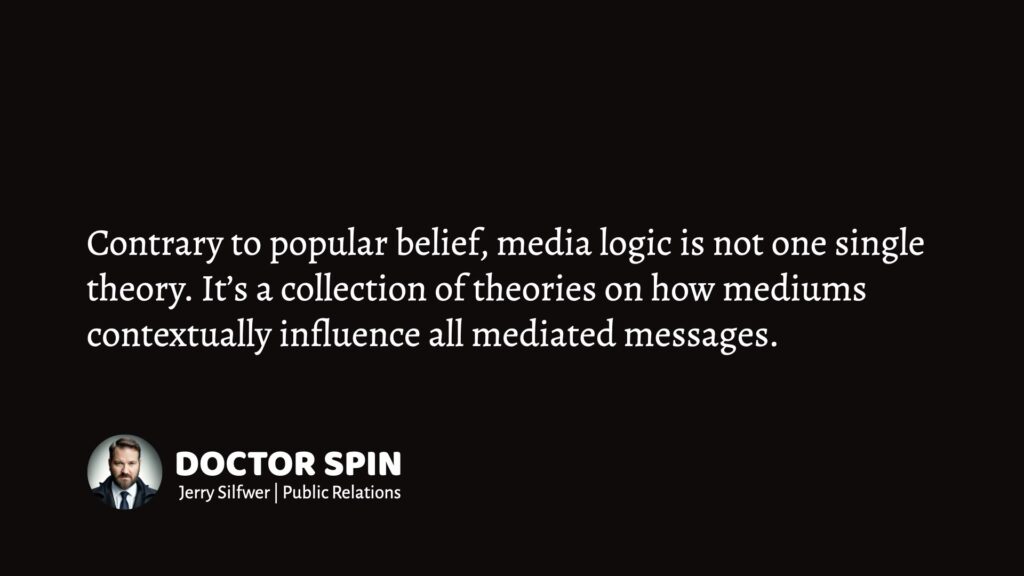We’re seeing an epidemic of corporational determinism.
Despite not demonstrating substantial advancements, many Big Tech companies are staging massive PR events. Without substance, they’re doing hour-long shows telling everyone how revolutionary they are.
For now, this strategy of corporational determinism is working. But will audiences tire of these self-glorifying proclamations?
I think they might.
Here we go:
Corporational Determinism
A recent research paper proposes a new theoretical concept for PR messaging — corporational determinism.
“This paper proposes a new theoretical concept, corporational determinism, to describe narratives by which digital media corporations are presented as the main or only agency informing socio-technical change. It aims to unveil how digital media corporations employ such narratives to reinterpret the past of digital media, to underline their leading role in present societies, and to show their ability in predicting and shaping the future.“
Source: Critical Studies in Media Communication 1Natale, S., Bory, P., & Balbi, G. (2019). The rise of corporational determinism: digital media corporations and narratives of media change. Critical Studies in Media Communication. … Continue reading
I’m sure many of us would agree that Big Tech have a flair for wanting to rewrite history and name themselves as lead dominos in changing the world.
It’s also fair to assume that Big Tech is pushing this narrative past the point of being that corporate cringe type at a social event who can’t stop talking about how magnificent they are.
It’s corporate humblebragging.
Without humility.
Grandiose Ideas of Self-Importance
Taking pride in actual accomplishments is sensible. Revising history to fit with grandiose exaggerations is … corporate cringe?
“Believing that one single device brought about a digital revolution is like seeing a crowd of people in Times Square and assuming they turned up because you broadcast on WhatsApp that everyone should go there. It is, however, a convenient point of view for huge corporations such as Apple or Google. To keep their position in the digital market, these companies not only need to design sophisticated hardware and software, they also need to nurture the myth that we live in a state of incessant revolution of which they are the key engine.“
Source: Fast Company 2Nataly, S., Balby, G., & Bory, P. (2019, October 16). The real reason Apple and Google still hold big launch events. Fast Company. … Continue reading


Examples of Corporational Determinism
Big Tech PR events are increasingly performative, often as self-glorifying spectacles rather than platforms for substantial product innovation.
Here are five examples of Big Tech’s most self-congratulatory PR events, where the spectacle often overshadowed the actual substance:
Apple’s “Courage” Moment / iPhone 7 Keynote (2016)
Apple’s 2016 iPhone 7 event was a masterclass in corporate self-praise. For a significant portion of the presentation , Apple rationalised why removing a beloved feature was a bold act of innovation. They positioned the lack of a headphone jack as an act of “courage” rather than a cost-cutting, accessory-pushing decision.
Apple then sold a separate $159 pair of AirPods to solve the problem they created.
Google’s AI-Powered Call That Was Too Human / Google Duplex (2018)
At Google I/O 2018, Sundar Pichai demoed Google Duplex, an AI-powered assistant that could make calls on your behalf and sound disturbingly human. The demo — a seemingly perfect conversation between AI and real people — was hailed as groundbreaking, but it felt more like a tech magic show than an actual product announcement.
Five years later, Duplex still isn’t widely available, proving it was more hype than substance.
Facebook’s “Metaverse Revolution” / Connect 2021
Mark Zuckerberg’s Meta rebrand and Connect 2021 event was an endless self-indulgent pitch for a future that didn’t exist. He promised an immersive, world-changing “metaverse”, but the actual demonstration was a bunch of floating legless avatars in an empty digital space. Zuckerberg spent an hour convincing people that Meta was revolutionising the world, despite having nothing functional to show.
The “metaverse” quickly became a financial disaster, leading to massive layoffs and Meta pivoting back to AI in 2023.
Tesla’s Cybertruck Reveal / Elon’s Window Shattering Fail (2019)
Elon Musk’s Tesla Cybertruck event in 2019 was meant to redefine the pickup truck market, but it quickly turned into a meme-worthy PR disaster. Tesla hyped up its “shatterproof” armored windows, only for Musk himself to accidentally smash them on stage with a metal ball.
Despite the over-the-top spectacle, Cybertruck production was delayed for years, and the final product looks almost nothing like the original concept.
Microsoft’s AI Hype Event / Bing AI “Revolution” (2023)
When Microsoft launched AI-powered Bing (2023), they acted like they had crushed Google overnight. Nadella called it “the biggest innovation in search in decades.” What happened next? The AI hallucinated fake results and gave bizarre responses (e.g., Bing’s chatbot told a user to leave his wife).
The event hyped AI as a “Google killer” but didn’t fundamentally shift search trends. Despite the massive PR push, Bing AI didn’t change search behavior, and Google still dominates 91% of the market.
Finding the Right Messaging Balance
The PR strategy of corporational determinism is showing signs of audience fatigue. Tech journalists are getting more skeptical of grandiose proclamations.
The problem with these events is that they treat progress as inevitable, inflate minor updates into revolutions, and promise the world before they even deliver a street.
Instead of making it all about the new products, focusing the core message on how the brand fits within a larger story could also make sense outside Big Tech.
The challenge? We must balance a confident brand narrative to avoid obnoxious corporate cringe.
Learn more: Corporational Determinism
Corporate Cringe
Many corporate texts are written in poor taste. Unlike many other creative professions, corporate communications have somehow forgotten that having great taste is an actual skill.
I sometimes wonder if corporate communications suffer from an industry-wide shortage of good taste.
Here are some typical examples of corporate cringe:
By being aware of these pitfalls, organisations can refine communication strategies to ensure more authentic and effective engagement with their stakeholders, influencers, and publics.
More examples: https://www.reddit.com/r/corporatecringe/
A Difficult Conversation
Perhaps we’re drowning ourselves in corporate cringe since we’ve never had this conversation.
Having worked as a corporate communications adviser since 2005, I’ve told CEOs that their strategies are plain wrong. I’ve told marketers that they’re hurting their brand from short-sightedness. I’ve told communicators that they’ve spent huge budgets on unnecessary activities.
Why? Because clients pay me to be a truth-sayer.
Writing, however, is… a touchy subject.
Tell a head of communications that their corporate communication is cringe, and you’re out faster than their minions can slam the door behind you.
Telling anyone their writing sounds boring is rough — even for me — but it must be done.
If you drench corporate communication with platitudes and uninspired, stale, and corny hyperboles, it does make a difference.
We might adequately plan, execute, and measure our activities, but that won’t matter if our communication activities sound corny.
Good Taste is a Rare — But Important — Skill
Unlike many other creative professions, corporate communications often seem oblivious to the importance of being … tasteful. Our industry’s ignorance of what constitutes good taste is peculiar because we ought to know better.
We are communication professionals, after all.
Tonality isn’t just for copywriters.
Look and feel isn’t just for art directors.
Great taste is a PR skill, too.
But there’s a way out of this poorly lit tunnel of mediocrity. We’re in a position to mitigate cringe-worthy corporate messaging:
If you’re blessed with a colleague with a sense of taste, let them have their say. Don’t allow ego and hierarchy to get in the way of good communication.
Never settle, never give up.
Join the fight against corporate cringe.
Learn more: Corporate Cringe
Classic Media Logic: Beware the News
Classic media logic can be regarded as a rhetorical approach to PR theory.
“The position and size of articles on the front page is determined by interest and importance, not content. Unrelated reports […] are juxtaposed; time and space are destroyed and the here and now are presented as a single Gestalt. […] Such a format lends itself to simultaneity, not chronology or lineality. Items abstracted from a total situation are not arranged in causal sequence, but presented in association, as raw experience.“
Source: The new languages (1956) 3Carpenter, E. & McLuhan, M. (1956) The new languages. Chicago Review. 10(1) pp. 46 – 52.
Contrary to popular belief, classic media logic is not one single theory. Instead, it’s a collection of theories about how the medium and its context influence mediated messages.
“[…] each communication channel codifies reality differently and thereby influences, to a surprising degree, the content of the message communicated.”
Source: The new languages (1956) 4Carpenter, E. & McLuhan, M. (1956) The new languages. Chicago Review. 10(1) pp. 46 – 52.
Classic Media Logic Effects
Classic media logic is hypothesised to influence the news media in the following ways: 5Nord, L., & Strömbäck, J. (2002, January). Tio dagar som skakade världen. En studie av mediernas beskrivningar av terrorattackerna mot USA och kriget i Afghanistan hösten 2001. … Continue reading
“The dominant processes, established routines, and standardized formats which frame and shape the production of mass-media content, especially its representation or construction of reality, and its manufacture of news. Media logic intersects with commercial logic and political logic — confluences associated with such phenomena as tabloidization and the mediatization of politics. Media logic exists wherever mediation exists. It contributes to the shaping of social order in modern post-industrial cultures.“
Source: Oxford Reference 6Media Logic. (2023). Oxford Reference. https://www.oxfordreference.com/display/10.1093/oi/authority.20110810105357611

Learn more: Media Logic is Dead, Long Live Media Logic

THANKS FOR READING.
Need PR help? Hire me here.

Spin Academy | Online PR Courses

Spin’s PR School: Free Corporate PR Course
Explore this Free Corporate PR Course to learn strategic communication insights and techniques and stay ahead in the competitive public relations industry.
Corporate Communications
Agency Collaboration
Corporate Messaging
Corporate Challenges
Learn more: All Free PR Courses
💡 Subscribe and get a free ebook on how to get better PR.



